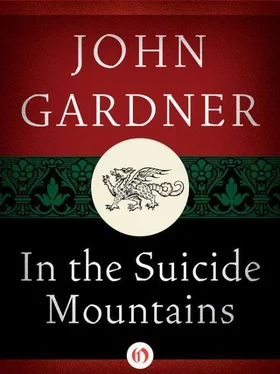“You can’t do this!” cried Prince Christopher, stepping back from the abbot’s sword. “I’m defenseless!”
“How thoughtless of you,” said the six-fingered man, and laughed. He began moving toward the prince, backing him toward the cliff. Still Armida and the dwarf hung fire.
“Tell me just one thing,” said the prince. “What happened to the real abbot? And also, how does it happen that you can cure the sick?”
The six-fingered man continued slowly toward him, smiling eerily and moving the sword from side to side with a swing of the wrist. “The saintly abbot and all his holy monks are dead. All dead. They await you at the bottom of the cliff. Our band has replaced them. As for the miracles, the old man never knew himself how he did them, so how should I? I simply mimic: I do exactly what he did, to the last microscopic tremor.” He made as if to lunge, and the prince glanced behind himself and made a whimpering noise. Up the hill, above them, the evil monks were gathering at the corners of the monastery, and every one of them had a sword or a mace, glinting in the moonlight. When they were all assembled they began to come down toward the cliff-edge, walking slowly, more silently than owls.
“Tell me this,” said the prince. “ Why do you heal the sick? It seems a queer thing for a murderer to do. ”
It seemed to Armida that the false abbot blanched. His mouth gave a jerk — a fierce nervous tic. “Don’t ask me that,” he said.
“But I do ask it,” said the prince, and stopped backing up. He’d reached the edge.
The six-fingered man said, swinging the sword from side to side more quickly now, switching it, in fact, “I don’t know why I heal the sick. It’s just one of the things the old abbot used to do, so it’s necessary, a part of my act. And I like it.”
“You like it?” Chudu the Goat’s Son broke in. “You? — a homicidal maniac?”
The six-fingered man glanced at him, then back at the prince. Armida now began to move, very slowly, her white dress rippling in the mountain wind. Little by little she was working her way around behind the man. The six-fingered man said: “It makes me feel good. I don’t pretend to understand it. I feel light, as if in a minute I might levitate, and sometimes I hear music — a women’s choir. I feel myself getting warm, practically burning up; but it’s pleasant, downright glorious. Sometimes I smell incense. Don’t ask me any more, I don’t want to think about it. When it’s over and I’m my normal self again, it’s terrible — terrible! All I can think about is jumping off the cliff.”
And now, as if at some signal from Armida, Chudu the Goat’s Son rushed straight at the murderer, bellowing with gleeful, boundless rage, and the exact same instant Armida screamed “ Yi! ” like a wild insane savage and leaped six feet onto the murderer’s back. The Goat’s Son turned into a huge anaconda and wrapped his fat body around the murderer’s two arms, and squeezed and constricted till the six-fingered man dropped the sword. Armida, by this time, had her knife at the man’s throat, and the prince, by this time, had picked up the sword and was stabbing him with it. (He had no choice; no jail in the world could hold the six-fingered man.)
“Tricked!” cried the six-fingered man, and burst out crying. “The dwarf did do magic, and it was the girl that killed the dragon! I knew it all the time!”
To hush him before anyone could hear what he was saying, Christopher the Sullen cut his head off and — with the same swipe, by accident — cut off one six-fingered hand. He put the hand in his pocket. The head, as soon as it hit the ground, cried: “Praise God!”
For an instant, the Suicide Mountains fell silent, as if holding their breath, amazed.
Now the monks all came running, shouting and swearing oaths. “ Let them all be mules! ” shouted Chudu the Goat’s Son, and at once they were all mules, and their weapons fell clattering. They stopped running and turned and stared at each other and a few began to kick.
“Good thinking,” cried Armida. “We’ll hitch them up to the treasure wagons and drive them to the palace, and when we get there we can change them back to people and chuck them in the dungeon!” The prince, Armida, and the dwarf began rounding up the mules. Even with Chudu’s magic they were hard to catch, but by the time the first cock crowed and the sky began to light, the last of them was captured and hitched securely to his treasure wagon.
“There’s one last thing we must do before we leave,” said the prince. “We must bury the six-fingered man.”
“That’s true,” Armida said. “For all his evil, he had good in him, too, and he relieved the suffering of as many people as he murdered. It would be wrong to leave his bones for the crows to pick.”
So they left the mules to stand waiting in the barn, chewing oats and hay, and walked around to get the body and carry it to a burial place. Lo and behold, when they reached the green slope where the body had lain there was no sign of it, neither clothes nor blood; but there was a new-born babe sitting picking the grass and trying to eat it, getting dirt in its mouth but not minding in the least, burbling and larbling and chirping like a sparrow. When they picked it up it laughed at them happily, and they noticed it had only one hand, and the hand had six fingers.
Much puzzled, they carried the babe along with them and set him down under a tree while Armida and the dwarf got out the wagons and Prince Christopher the Sullen went to the horsebarn and saddled his horse. When Boy was saddled the prince got up in the saddle with the babe, and Armida and the dwarf climbed up into the seat of the lead wagon, with the rest of the mules and wagons tied one after another behind, each wagon richer than the last, and they started for the palace.
“Does it talk yet?” Armida called forward to the prince.
“I don’t know.” He asked the baby: “Can you talk yet?”
The baby smiled merrily and nodded and began to talk:
Chapter Sixteen. The Baby’s Tale
In a certain village there lived two brothers, a rich one and a poor one. The rich one lived square in the center of town and had a huge wooden house and was a member in good standing of the merchants’ guild. But the poor one, more times than I care to tell, had not even so much as dry bread to eat, and when his little children wept and begged for food he had nothing at all he could give them, but bade them suck on rags. From long before sun-up to long after dark, the poor man struggled like a fish against ice, but he could never earn anything.
“One day he said to his wife, ‘I will go to the center of town and ask my brother for help.’ ‘Go then,’ said his wife, ‘but your brother is a pig and will not help you.’ He came to the rich man and said, ‘Ah, my own brother, help me a little in my misery. My wife and children are without food, they go hungry for days on end.’ His brother answered him, ‘Work in my house for a week, then perhaps I will help you.’ What could the poor man do? He set to work, swept the yard, curried the horses, carried water, and chopped wood. At the end of the week the rich brother gave him one loaf of black bread. ‘This is for your work,’ he said. ‘Thank you even for that,’ said the poor brother. He bowed low, till his head was against the floor, and was about to go home. ‘Wait,’ said the rich man. ‘Come and visit me tomorrow and bring your wife with you. Tomorrow is my birthday.’ The poor man was ashamed and said, ‘Brother, I don’t belong there, you know it well. Your other guests will be merchants in glittering boots and fur coats, and I wear plain linden bark shoes and a wretched gray caftan.’ ‘Never mind, just come. There will be a place for you.’ ‘Very well then, brother, I will come.’
Читать дальше












